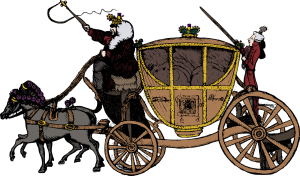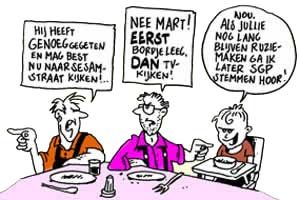politics
 Politics is about the survival of a group, a tribe, a nation. Animals practise politics. Chimpanzees, for example, form coalitions as a strategy to obtain power and respect. The reward for a high position is access to women and consequently the spreading of the male’s genetic material. This is the reason why politics, in so far as it is publicly visible, has always been dominated by men, which is not the same as women’s suppression by men.
Politics is about the survival of a group, a tribe, a nation. Animals practise politics. Chimpanzees, for example, form coalitions as a strategy to obtain power and respect. The reward for a high position is access to women and consequently the spreading of the male’s genetic material. This is the reason why politics, in so far as it is publicly visible, has always been dominated by men, which is not the same as women’s suppression by men.
Reward
Because women select the best men to optimise their own reproduction and child care, they in fact dominate the men and form the underlying power in society, with far-reaching consequences for morals and practices, among which the ‘suppression’ of women.
Politics: royal power
In kingdoms like The Netherlands, the position of the monarch is inherited. The direct political influence of the king is limited compared to that of an elected president, but those who believe that the throne no longer has any political power are mistaken. The royal family is considered the symbol of unity of the nation, which means that it has at least great symbolic, emotional and cultural power. It may even be said that in the process of democratisation over the past centuries, the monarch has actually become more powerful, because increasing numbers of people have gathered behind the throne through their right to vote: first the rich, then all the men, then the women as well. The positive side to this is that more people have become involved in politics, a typical aspect of modern society, with at least the beginning of a justice system, a free press, education for all, welfare and health care, all of this in a relative sense and to a certain degree. The negative side is that those who have the right to vote are citizens and think in terms of power that they need to exercise over others, those at the bottom, as it were: children, the poorest, aliens, criminals, peripheral and critical groups. In other words, the royal power has engaged the majority of citizens in defense of property and self interest, inequality, obsession with individual and national security.
Political power and the family
The royal family (and in republics the presidential family) represents all families and thus symbolises the family ideology. The bond between the people and the royal family is rooted in this sexual fundament, and is accompanied by strong emotions. Quarrels within the royal family are intensely followed by the public mind, through the media. The fairy-tale image of royalty is mixed with scandal and occasional indignation, which serves to keep the family structure in tact. In this way political power is exerted, not only from the top down, but through stories and images that are generated constantly in all places, but especially at the bottom of society. This may be called a ‘mythology’ of family life, which is so pervading that hardly anyone can even think outside it. Constant propaganda for the family is needed to compensate for the real shortcomings of everyday family life.
Seen as an emblem of goodness, national unity, survival even, the royal or presidential family exercises enormous cultural and emotional power, which cannot but pervade the political world of the constitution, parliament and state organs, ministerial departments, but also schools and universities, the armed forces, the legal and health systems.
Politics is based on instinct and emotions
Thus politics is not, and cannot be expected to be, the expression of a noble human spirit, the highest calling. On the contrary, it is based on instincts and emotions. Politics consists of necessary (verbal) violence directed at opponents. The degree of extremity and intensity of political controversy reflects the degree of primitivity of a society, small or large. Politics demonstrates the primitivity of humankind, even though in its form it can be more or less civilized. No one can be successful in politics without participating in (self)deceit, hypocrisy, and corruption. Political discussions and decisions usually pose the wrong questions and provide the wrong answers. New insights are always born in the far corners of society, only to appear on the political agenda much later, and in a distorted form . Thus we must see politics in perspective and understand its shortcomings as well as its necessity. To imagine the absence of any politics is almost impossible.
Sexual politics

Politics: separation between private and public life
A prerequisite for becoming a politician is to have ‘a clean record’. Separation between private and public life is a firm requirement, and a way of protecting the individual politician. The underlying idea is that politicians have to be honest and good people. In reality that is too high a demand, and thus only clear cases of fraud or corruption can lead to dismissal. The implication of ‘clean record’ is also sexual. Politicians must create the impression that they subscribe to the sexual system, and accept the sharp division between private and public life while at the same time realising that they as public upholders of sexual morality cannot be seen to deviate from the ruling opinion.
Politics: repressive tolerance
Politics is indispensable for the realisation of new ideas. Political discussion and struggle in the western world have resulted in the availability of contraceptive and abortion services, in some countries under more restrictions or with more opposition than in others. Some aspects of sexual reform have only been realised in a few countries such as Holland, sex education in school, public nudist beaches, legal recognition of partnership in unwed couples, gay marriage and gay couples’ rights to adopt children, the legalisation of prostitution. This is progression compared to other places and times and thus a reason for joy, but these things need to be judged by their own merits. Allowing people to go naked on certain beaches is a typical example of repressive tolerance, while gay marriage is a form of conformism. We have to take into account what has not yet, or only partially, been reached, and what has been rejected by politics at first, as usual. The legislation for genetic research – indispensable for further sexual reform – is as restrictive as the legislation on birth control was a hundred years ago.


